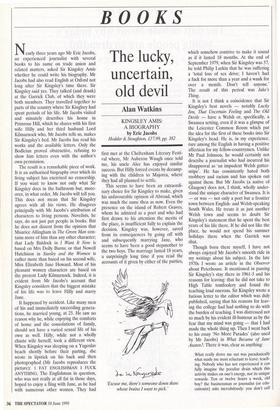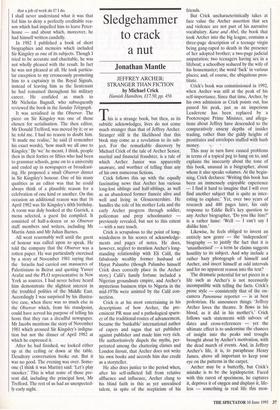BOOKS
The luc uncertain, old devil
Alan Watkins
KINGSLEY AMIS: A BIOGRAPHY by Eric Jacobs Hodder & Stoughton, ilZ99, pp. 382 Nearly three years ago Mr Eric Jacobs, an experienced journalist with several books to his name on trade union and related matters, asked Sir Kingsley Amis whether he could write his biography. Mr Jacobs had also read English at Oxford not long after Sir Kingsley's time there. Sir Kingsley said yes. They talked (and drank) at the Garrick Club, of which they were both members. They travelled together to parts of the country where Sir Kinglsey had spent periods of his life. Mr Jacobs visited and minutely describes his house in Primrose Hill, which he shares with his first wife Hilly and her third husband Lord Kilmarnock who, Mr Jacobs tells us, makes Sir Kingsley's bed. Mr Jacobs has read his works and the available letters. Only the Bodleian proved obstructive, refusing to show him letters even with the author's own permission.
The result is a remarkable piece of work. It is an authorised biography over which its living subject has exercised no censorship. If you want to know not only what Sir Kingsley does in the bathroom but, more- over, in what order, Mr Jacobs will tell you. This does not mean that Sir Kingsley agrees with all his views. He disagrees principally with Mr Jacobs's attribution of characters to living persons. Novelists, he says, do not just put people in books. But he does not dissent from the opinion that Maurice Allingham in The Green Man con- tains more of him than any other character; that Lady Baldock in I Want It Now is based on Mrs Dolly Burns; or that Nowell Hutchison in Stanley and the Women is rather more than based on his second wife, Miss Elizabeth Jane Howard. Most of his pleasant women characters are based on the present Lady Kilmarnock. Indeed, it is evident from Mr Jacobs's account that Kingsley considers that the biggest mistake of his life was to leave Hilly and marry Jane.
It happened by accident. Like many men of his and immediately succeeding genera- tions, he married young, at 25. He saw no reason why he, while enjoying the comforts of home and the consolations of family, should not have a varied sexual life of his own as well. Hilly, while not a wholly chaste wife herself, took a different view. When Kingsley was sleeping on a Yugoslav beach shortly before their parting, she wrote in lipstick on his back and then photographed (Mr Jacobs reproduces the picture): 1 FAT ENGLISHMAN I FUCK ANYTHING. The Englishman in question, who was not really at all fat in those days, hoped to enjoy a fling with Jane, as he had with numerous other women. They had first met at the Cheltenham Literary Festi- val where, Mr Auberon Waugh once told me, his uncle Alec has enjoyed similar success. But Hilly forced events by decamp- ing with the children to Majorca, where they had all planned to settle.
This seems to have been an extraordi- nary choice for Sir Kingsley to make, given his unfavourable opinion of Abroad, which was much the same then as now. Even the presence on the island of Robert Graves, whom he admired as a poet and who had first drawn to his attention the merits of the place, is insufficient fully to explain the decision. Kingsley was, however, saved from its consequences by going off with and subsequently marrying Jane, who seems to have been a good stepmother to the two boys. The marriage lasted 18 years, a surprisingly long time if you read the accounts of it given by either of the parties, 'Excuse me, there's someone down there whose brains I want to pick' which somehow contrive to make it sound as if it lasted 18 months. At the end of September 1979, when Sir Kingsley was 57, he told Philip Larkin that he was suffering a 'total loss of sex drive; I haven't had a fuck for more than a year and a wank for over a month. Don't tell anyone.' The result of this period was Jake's Thing.
It is not I think a coincidence that Sir Kingsley's best novels — notably Lucky Jim, That Uncertain Feeling and The Old Devils — have a Welsh or, specifically, a Swansea setting, even if it was a glimpse of the Leicester Common Room which put the idea for the first of these books into Sir Kingsley's head. He is, in my experience, rare among the English in having a positive affection for my fellow-countrymen. Unlike Mr Paul Johnson, he would certainly not describe a journalist who had incurred his disapproval as 'an impudent Welsh gutter- snipe'. He has consistently hated both snobbery and racism and has spoken out against them. But Mr Jacobs (a native of Glasgow) does not, I think, wholly under- stand the unique character of Swansea. It is — or was — not only a port but a frontier town between English- and Welsh-speaking South Wales. He treats it as just another Welsh town and seems to doubt Sir Kingsley's statement that he spent the best years of his life there. If he did not like the place, he would not spend his summer holidays there when the Garrick was shut.
Though born there myself, I have not always enjoyed Mr Jacobs's smooth ride in my writings about his subject. In the late 1970s I wrote an article in the Observer about Peterhouse. It mentioned in passing Sir Kingsley's stay there in 1961-3 and his reasons for leaving: that he did not take to High Table tomfoolery and found the teaching load onerous. Sir Kingsley wrote a furious letter to the editor which was duly published, saying that his reasons for leav- ing the college had had nothing to do with the burden of teaching. I was distressed not so much by his evident ill-humour as by the fear that my mind was going — that I had made the whole thing up. Then I went back to his essay 'No More Parades' (also used by Mr Jacobs) in What Became of Jane Austen?. There it was, clear as anything:
What really drove me out was paradoxically what made me most reluctant to leave: teach- ing. Nobody who has not experienced it can fully imagine the peculiar drain which this activity makes on one's energy, nor its unique rewards. Ten or twelve hours a week, old boy? the businessman or journalist (or edu- cationist) asks incredulously: you don't call that a job of work do I? I do.
I shall never understand what it was that led him to deny a perfectly creditable rea- son which had impelled him to leave Peter- house — and about which, moreover, he had himself written candidly.
In 1982 I published a book of short biographies and memoirs which included Sir Kingsley as one of its subjects. Though I tried to be accurate and charitable, he was not wholly pleased with the result. In fact he was not pleased at all. He took particu- lar exception to my erroneously promoting him to a captaincy in the Royal Signals, instead of leaving him as the lieutenant he had remained throughout his military career. He confided as much to Mr Nicholas Bagnall, who subsequently reviewed the book in the Sunday Telegraph.
It was serialised in the Observer. The piece on Sir Kingsley was one of those chosen for serialisation. The then editor, Mr Donald Trelford, was moved by it; or so he told me. I had no reason to doubt him. 'It made me realise,' he said (I remember his exact words), 'how much we all owe to Kingsley.' By 'we' he meant, I think, people then in their forties or fifties who had been to grammar schools, gone on to a university and ended up in newspapers or broadcast- ing. He proposed a small Observer dinner in Sir Kingsley's honour. One of his many qualities as an editor was that he could always think of a plausible reason for a celebration of one kind or another. On this occasion an additional reason was that 16 April 1982 was Sir Kingsley's 60th birthday. A room was duly booked at the Garrick, a menu selected, a guest list compiled. It consisted of half-a-dozen or so Observer staff members and writers, including Mr Martin Amis and Mr Julian Barnes.
All went reasonably well until the guest of honour was called upon to speak. He told the company that the Observer was a rotten paper. He was particularly exercised by a story of November 1981 saying that the Israelis had carried out massacres of Palestinians in Beirut and quoting Yasser Arafat and the PLO representative in New York as sources. I had never before heard him demonstrate the slightest interest in the troubled politics of the Middle East. Accordingly I was surprised by his illustra- tive case, when there was so much else in the Observer which, from his standpoint, could have served his purpose of telling his hosts that they ran a dreadful newspaper. Mr Jacobs mentions the story of November 1981 which aroused Sir Kingsley's indigna- tion but not the dinner of April 1982 at which he expressed it.
After he had finished, we looked either up at the ceiling or down at the table. Desultory conversation broke out. But it was no good. The evening was over. Some- one (I think it was Martin) said: 'Let's play snooker.' This is what some of those pre- sent did, including the principal host, Mr Trelford. The rest of us had an unexpected- ly early night.



































































 Previous page
Previous page